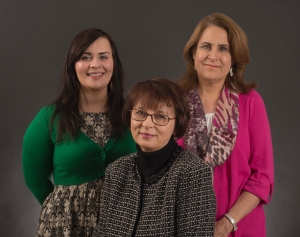English students, professor present at international James Joyce conference

Riley Dishner, Jolanta Wawrzycka and Martha Gilchrist.
Earlier this month, two Radford University graduate students made the journey to Italy to present at the seventh annual James Joyce Italian Foundation Graduate Conference in Rome.
Martha Gilchrist, of Roanoke, and Riley Dishner are studying for Master of Arts in English degrees and they jumped at the chance to join international scholars in celebrating James Joyce, the beloved Irish writer known for works such as "Ulysses," "Dubliners" and "Finnegans Wake." The students were joined by Jolanta Wawrzycka, RU's own resident Joyce scholar.
"It was a great honor to represent Radford in this way, to meet the group of scholars at the conference and to know that I could make a contribution to the field of English literary study," said Gilchrist, who is a public school teacher in Roanoke by day.
The conference is held in early February every year to celebrate Joyce's birthday on Feb. 2. This year the celebration stretched from Feb. 5 through 7 and hosted scholars from around the world.
Gilchrist's presentation, titled "Joyce Brothers, Mr. Duffy, 'A Painful Case': Synthesizing Oppositions," contributed a new analysis of a character in a short story in "Dubliners." While researching previous perspectives on the character, she recognized some potential gaps in critical approaches.
"The previous criticism of the character and his story has offered some interesting theoretical perspectives," Gilchrist said. "To me, it had not provided a complete picture of Joyce’s intended narrative meaning. I wanted to offer another viewpoint."
Dishner also took the opportunity to explore "Dubliners" further, expanding her research into political and cultural topics with a presentation titled "Consuming Culture: A Marxist Postcolonial Examination of Eating Practices in Select stories from 'Dubliners.'"
The conference is sponsored by the James Joyce Italian Foundation, a non-profit association based at the University of Rome III that promotes the international study and research of graduate students and academics who esteem Joyce as an important figure of literary and cultural tradition. There remains a large interest in Joyce in Italy because of his nearly two decade residency in the city of Trieste.
Wawrzycka has attended the conference every year since 2008. Gilchrist and Dishner are the third and fourth students she has brought to present their research. "It makes my classroom time more meaningful because every time I teach on a graduate level I'm always on the lookout for someone who might have a special appreciation of Joyce, a talent for critical reading of his works, or a curiosity about the Irish culture," she said.
In addition to acting as a mentor, Wawrzycka also brought her own Joyce scholarship to the conference. She was invited to deliver a keynote address and her presentation was titled "Dubliner di color che sanno,” which can be translated as "Dubliner of the kind that knows." The phrase is paraphrased from "Ulysses," which is perhaps Joyce's most famous work. It comes from Dante’s description of Aristotle and it refers to the type of person who knows just about all there is to know about literature, culture or the world at large. According to Wawrzycka, Joyce was “that kind of Dubliner” and it was Joyce's intellect and cultural acuity that ensured his works would be studied after his death.
"New readings often uncover the significance of things we didn't realize earlier, like Joyce's critique of British colonization of Ireland," Wawrzycka said. "Joyce's use of language still is quite revolutionary in terms of vocabulary, in terms of representation. His works are like encyclopedias, so you learn a lot. Also, he’s just a sheer joy to read and he really truly is a funny writer."
According the Wawrzycka, her students represented RU with eloquence and intellect, both earning positive responses from the assembled scholars.
"I was very flattered by compliments that were given to me by other students about my students’ presentations especially since most of the students who attend the conference in Rome are Ph.D students from pretty renowned institutions around Europe," Wawrzycka said. "Our students compete perfectly. Once you 'do your Joyce homework' and have an interesting perspective on Joyce’s texts, you definitely belong in that group. I’m very proud of Marty and Riley – their presentations were great!"